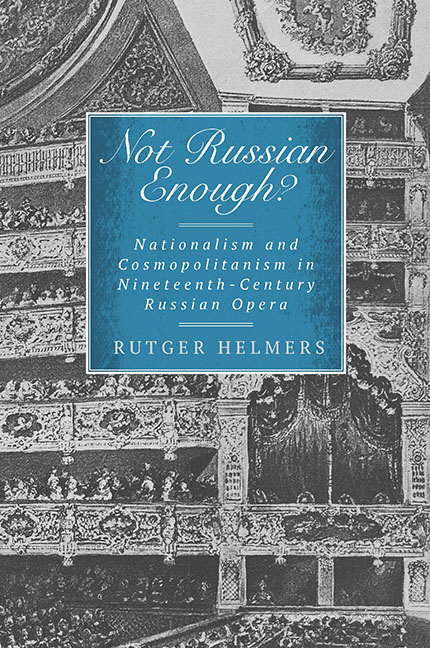Book contents
- Frontmatter
- Dedication
- Contents
- List of Illustrations
- Acknowledgments
- Editorial Notes
- Introduction: The Part and the Whole
- A Life for the Tsar and Bel Canto Opera
- Subject Matter, Local Color, and National Style in Judith
- French Theatricality and Inadvertent Russianisms in The Maid of Orléans
- The Tsar's Bride and the Dilemma of History
- Conclusion
- Abbreviations
- Notes
- Bibliography
- Index
The Tsar's Bride and the Dilemma of History
Published online by Cambridge University Press: 15 March 2018
- Frontmatter
- Dedication
- Contents
- List of Illustrations
- Acknowledgments
- Editorial Notes
- Introduction: The Part and the Whole
- A Life for the Tsar and Bel Canto Opera
- Subject Matter, Local Color, and National Style in Judith
- French Theatricality and Inadvertent Russianisms in The Maid of Orléans
- The Tsar's Bride and the Dilemma of History
- Conclusion
- Abbreviations
- Notes
- Bibliography
- Index
Summary
For most of the twentieth century, the reception of Rimsky-Korsakov's ninth opera, The Tsar's Bride (1899), has been dramatically different in Russia, on the one hand, and Western Europe and the United States, on the other. In Russia, the opera continues to be one of the more popular works in the operatic canon and has commonly been regarded as one of Rimsky-Korsakov's great achievements. In the West the work as a whole has been met with indifference, incomprehension, or condemnation, although individual numbers have been admired by some critics: Ernest Newman praised Marfa's final aria in act 4 as “one of the purest and profoundest expressions of purely melodic ecstasy in the whole of music.”
Surely Russian pride in the national musical heritage can partly explain the difference in appreciation between East and West, but the opera has also been approached with different sets of critical values, especially with regard to its Russianness. In a series of lectures on national opera still during Rimsky-Korsakov's lifetime, Rosa Newmarch called The Tsar's Bride “more distinctly of the Italian melodic school than any other of his works.” Michel-Dimitri Calvocoressi concluded that opera “adheres to all the conventions of Western grand opera” and counted it one of Rimsky-Korsakov's most eclectic and weakest works. Montagu Montagu-Nathan, in his classic study of the history of Russian music, felt that the greater public had been “betrayed” by the opera's enthusiastic reception after its premiere in Moscow, and concluded that “a combination of Russian subject and Italian manner must still have been at even so late a date the approved ingredients of operatic success.” Gerald Abraham thought The Tsar's Bride “more than a little suggestive of Bizet-with-a-Russianaccent” and complained that the beauty of “one or two outstanding passages” in the score served only “to emphasize the insipidity of the music as a whole.” Curiously, Abraham suggested that the opera was written with such fluency in such a short time that its music could be considered “improvised,” free from “self-conscious nationalism,” and hence as a sample of Rimsky-Korsakov's “natural musical thought.” But since he stuck to the usual search for Russianness as his primary mode of analysis, Abraham concluded that although Rimsky- Korsakov was well suited to compose for “fairy-tale or village legend,” he “had hardly any opportunity to be himself” in The Tsar's Bride.
- Type
- Chapter
- Information
- Not Russian Enough?Nationalism and Cosmopolitanism in Nineteenth-Century Russian Opera, pp. 113 - 152Publisher: Boydell & BrewerPrint publication year: 2014



